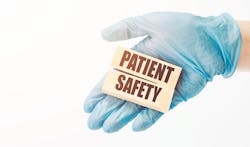PCAST Report Recommends ‘National Enterprise’ to Accelerate Patient Safety
Among the recommendations in a new report from a working group of the President’s Council of Advisors on Science and Technology (PCAST) is that the White House should appoint a patient safety coordinator reporting to President Biden on efforts to transform patient safety among all relevant government agencies.
In the report, PCAST said its recommendations would develop a national enterprise to accelerate the research, development, and deployment of policies and technologies that will improve patient safety in the United States.
“This is a major milestone in healthcare safety in the United States, and if implemented, we believe it will influence and improve patient safety and healthcare worker safety around the world, said Michael Ramsay, M.D., CEO of the Patient Safety Movement Foundation, in a statement. “Since our inception, we understood that for long-lasting change to happen, it would require direction from the highest levels of government. These recommendations could not have come at a better time because WHO’s World Patient Safety Day is on September 17th.”
The report acknowledges that despite significant efforts made by health professionals, agencies, and organizations, uniform, nationwide implementation of many known solutions has lagged. It also noted that parallel to improvement of patient safety is the additional and closely linked aim of improving safety for the healthcare workforce. PCAST adds that another benefit of widespread patient safety improvement will be substantial reductions in the total cost of healthcare in America.
PCAST also recommends that the President direct the HHS Secretary, in collaboration with the Department of Defense (DoD), and Department of Veterans Affairs (VA), to require the appropriate federal agencies to develop a list of high-priority harms, evidence-based practices, and system-level mitigation strategies to eliminate preventable harms, including “never events” that should never occur in healthcare. As many measures as possible should be generated from real-time automated electronic health data.
As part of this effort, the report said that HHS should incentivize the adoption of evidence-based solutions and require annual public reporting immediately and quarterly public reporting within five years.
PCAST envisions the creation of a learning ecosystem and shared accountability system to ensure that evidence-based practices are implemented.
To address disparities in patient safety, PCAST recommends a “whole of society approach” in the transformation effort. That would include improving data and transparency, and accelerating research and deployment of practices. PCAST also suggests developing a national patient safety research agenda.
Co-chairing the PCAST patient safety working group are Joe Kiani, who founded the Patient Safety Movement Foundation (PSMF) in 2012, and Microsoft Chief Scientific Officer Eric Horvitz. Also serving with Kiani and Horvitz on the working group are:
- Donald Berwick, M.D., Patient safety expert, CMS, Institute for Healthcare Improvement
- Lisa Cooper, Johns Hopkins University
- Sue Desmond-Hellmann, Former CEO, Gates Foundation, Former Chancellor UCSF
- Christopher Hart, Safety systems expert, National Transportation Safety Board
- Harlan Krumholz, M.D., Outcomes research pioneer, Yale University
- Julie Morath, R.N., Patient safety expert, Hospital Quality Institute
- Peter Pronovost, M.D., Patient safety expert, University Hospitals Cleveland Medical Center
- Sue Sheridan, Patient advocate, Patients for Patient Safety


